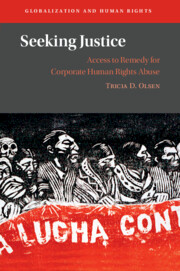Book contents
- Seeking Justice
- Globalization and Human Rights
- Seeking Justice
- Copyright page
- Dedication
- Contents
- Figures
- Tables
- Preface and Acknowledgments
- Abbreviations
- 1 Human Rights in the Corporate Context
- 2 Varieties of Remedy
- 3 The Corporations and Human Rights Database
- 4 How Contestation Shapes Access to Judicial Remedy Mechanisms
- 5 How Contestation Shapes Access to Non-Judicial Remedy Mechanisms
- 6 Does It Work?
- 7 Conclusion
- Appendices
- References
- Index
- Books in the Series
2 - Varieties of Remedy
How Contestation Shapes Governance
Published online by Cambridge University Press: 09 June 2023
- Seeking Justice
- Globalization and Human Rights
- Seeking Justice
- Copyright page
- Dedication
- Contents
- Figures
- Tables
- Preface and Acknowledgments
- Abbreviations
- 1 Human Rights in the Corporate Context
- 2 Varieties of Remedy
- 3 The Corporations and Human Rights Database
- 4 How Contestation Shapes Access to Judicial Remedy Mechanisms
- 5 How Contestation Shapes Access to Non-Judicial Remedy Mechanisms
- 6 Does It Work?
- 7 Conclusion
- Appendices
- References
- Index
- Books in the Series
Summary
Chapter 2 takes a deeper dive into the literatures on pragmatism and agonism to illustrate how, when combined, they provide the intellectual framing and underpinnings of the varieties of remedy approach. While pragmatism highlights the need to analyze the dynamics between local actors, their advocates, and the firms involved in the abuse, agonism opens us to the notion that non-violent contestation and confrontation could have a potentially positive role. With this foundation, I develop the varieties of remedy approach, exploring how contestation (e.g. claim making) shapes governance outcomes (e.g. access to judicial or non-judicial remedy mechanisms). Three pathways are discussed in greater depth in Chapter 2 – Institutional Strength, Corporate Characteristics, and Elevating Voices – and tested empirically in subsequent chapters.
Keywords
- Type
- Chapter
- Information
- Seeking JusticeAccess to Remedy for Corporate Human Rights Abuse, pp. 25 - 46Publisher: Cambridge University PressPrint publication year: 2023
- 1
- Cited by

